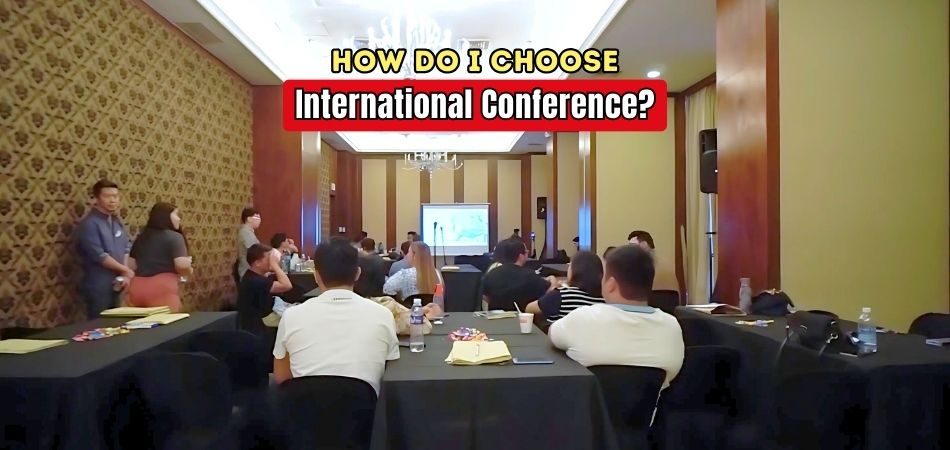Choosing the right international conference can be a career-changing decision. With so many options out there, finding the one that best suits your needs can feel challenging. When asking, “How do I choose an international conference,” you’re already on the path to making a strategic decision for your professional growth.
Choosing an international conference involves aligning your goals with the event’s offerings. It’s about finding a conference that matches your learning objectives, industry focus, and networking potential, ensuring you gain the most value from the experience.
Ready to discover the step-by-step process for choosing the ideal conference? Keep reading as we guide you through everything you need to know to make an informed choice.
Why Attending International Conferences Matters?
Attending international conferences can be a powerful step in your career and personal development. It’s more than just an event; it’s an opportunity to expand your horizons, connect with like-minded professionals, and gain fresh insights into your industry. Here are the top reasons why attending international conferences matters.
- Learning from Industry Experts: Conferences offer a chance to hear from leaders and innovators in your field. These experts share the latest trends, research, and ideas, providing knowledge that can shape your career.
- Expanding Your Network: Meeting professionals from different backgrounds broadens your network. Building these connections can lead to collaborations, partnerships, or even career opportunities down the line. Staying informed about upcoming international conferences can help you plan ahead and choose the right events to expand these connections.
- Showcasing Your Skills: Presenting your work or ideas at a conference highlights your expertise. It’s a great way to gain recognition in your industry and build credibility with peers and potential employers.
- Staying Updated on Industry Trends: Conferences often reveal upcoming changes and trends in your field. Staying ahead of these trends allows you to adapt and keep your skills relevant.
- Boosting Personal Growth: The experience of interacting with diverse professionals in a global setting enhances your confidence and communication skills, both personally and professionally.
- Gaining Inspiration and Fresh Ideas: Exposure to different perspectives can spark new ideas and innovative solutions to challenges you face in your work.
- Building Career Opportunities: Conferences often lead to unexpected opportunities like job offers, mentorship, or projects. You never know who you might meet that could influence your career path.
Whether you’re looking to learn, network, or showcase your skills, these events offer endless growth opportunities. Don’t miss the chance to connect, learn, and be inspired.
How Do I Choose an International Conference?
Choosing an international conference that aligns with your objectives is crucial for maximizing the benefits you gain from the experience. A well-chosen event can offer unmatched opportunities for learning, networking, and professional growth. Here’s how to make sure you’re picking the right one, broken down into eight essential points.
Clarify Your Goals
Start by identifying what you want to achieve. Are you aiming to gain knowledge, network with industry leaders, or showcase your work? Knowing your objectives will help you filter conferences that meet your specific needs, ensuring that you make the most of your time and resources.
Research the Conference’s Focus
Investigate the core focus of the conference. Make sure it covers topics relevant to your field and aligns with your learning or career goals. Attending an event that matches your interests will provide valuable insights and practical knowledge that you can apply in your work.
Review the Speaker Lineup
Check out the list of speakers who will be presenting. Look for industry leaders and experts who can offer valuable insights. If the speakers are well-regarded in your area of interest, you’re more likely to benefit from the sessions and discussions.
Examine the Agenda
The conference agenda should align with your learning objectives. Look for diverse session formats like workshops, keynote presentations, and panel discussions. A well-rounded agenda that balances learning with interactive opportunities will keep you engaged and motivated throughout the event.
Analyze Networking Opportunities
One of the biggest advantages of attending an international conference is the chance to network. Make sure the event offers plenty of opportunities for interaction, such as networking sessions, roundtables, or social gatherings. Exploring different ways to participate in global conferences, such as speaking engagements or informal meet-ups, can also enhance your networking experience and professional visibility.
Consider the Location and Timing
Practical factors like location and dates play a significant role in your decision. Choose a conference that is conveniently located or offers virtual attendance options if travel is challenging. Make sure the event dates don’t conflict with other important commitments on your calendar.
Check Reviews and Testimonials
Past attendees’ experiences can provide valuable insights. Read reviews and testimonials about the conference’s quality, organization, and the value it offered. Positive feedback from others in your industry is a good sign that the event will meet your expectations.
Assess Your Budget
International conferences can be costly, so it’s essential to consider the overall expenses. Calculate the registration fees, travel, accommodation, and other related costs. Ensure the investment aligns with the potential benefits and growth opportunities the conference promises.
Taking these steps will guide you in choosing an international conference that perfectly aligns with your objectives. Making an informed decision will not only save you time and resources but also ensure you get the most out of your conference experience.
What to Look for in Conference Topics and Agendas?
When choosing a conference, the topics and agenda play a crucial role in deciding whether the event is worth your time and investment. The knowledge of what to look for can help you make a choice that aligns with your professional growth and learning needs.
Relevance to Your Field
Ensure that the conference topics directly relate to your area of expertise or interest. Relevant sessions will offer the most value by providing insights that can be applied to your work or research.
Diverse Range of Subjects
Look for conferences that cover a variety of subjects within the main theme. A diverse agenda exposes you to different ideas, trends, and innovations, enriching your knowledge and opening up new perspectives.
Interactive Sessions
Prioritize events that offer workshops, panel discussions, or Q&A sessions. These interactive formats encourage deeper engagement, allowing you to gain hands-on experience and connect directly with experts and fellow participants.
Up-to-date Industry Trends
The agenda should include sessions on the latest developments and emerging trends in your field. Staying current with industry trends will give you a competitive edge and keep you informed about where your sector is headed.
Experienced Speakers
Review the list of speakers to see if they are well-known experts in your industry. Conferences featuring reputable speakers tend to provide more valuable insights, as they share real-world experiences and innovative research.
Opportunities for Networking
An agenda that includes networking breaks or informal meet-ups is a big plus. These moments are perfect for meeting like-minded professionals, exchanging ideas, and building lasting connections that can benefit your career.
By focusing on these elements, you can choose a conference whose topics and agenda truly align with your goals, maximizing the value of your time and participation.
Can I Get an Invitation to Attend an International Conference?
Attending an international conference is a great way to grow your knowledge and expand your professional network. But getting an invitation isn’t always straightforward. If you’re wondering how to secure that invite, here are some effective strategies to increase your chances of attending.
Submit a Paper or Proposal
Many conferences invite participants who submit research papers, case studies, or proposals related to the event’s theme. If accepted, you’ll often receive a formal invitation, along with the opportunity to present your work.
Apply as a Speaker or Panelist
If you have expertise in a particular field, consider applying to be a speaker or a panelist. Conferences often seek professionals to lead discussions or present insights, and being selected can come with a complimentary invitation.
Request an Official Invite as an Attendee
Some conferences provide invitations to attendees who request them. Contact the organizers directly, express your interest in the event, and explain how your presence would be mutually beneficial. Demonstrating your relevance increases your chances of getting invited to global conferences to upgrade your career.
Join Industry Associations or Networks
Being part of relevant professional groups or industry associations increases your chances of getting invited to conferences. Members often receive exclusive invitations to high-profile events, along with discounted registration fees.
Leverage Your Academic or Professional Contacts
Reach out to your network for recommendations or referrals to conference organizers. If you know someone involved in planning the event, ask them for an introduction or a direct invitation to attend.
Keep an Eye on Early Bird Registrations
Some conferences offer invitations to early registrants as a way to secure attendance. Registering early not only saves money but might also come with added benefits like special access or networking opportunities.
By following these steps, you can increase your chances of receiving an invitation to attend an international conference, opening doors to valuable learning and connections.
Avoiding Common Mistakes When Choosing an International Conference
Choosing the right international conference can be tricky, especially with so many options available. It’s easy to make a few missteps along the way. Here are the common mistakes to avoid when selecting an international conference, ensuring that you make the most of your investment in time and resources.
Skipping Research
Many people jump into conferences without fully researching the event’s relevance to their goals. Take the time to explore the agenda, speaker lineup, and past attendee reviews to see if the event truly aligns with your needs.
Overlooking Your Objectives
Without clear objectives, it’s difficult to know if a conference is worth your time. Identify your goals before you choose—whether it’s learning, networking, or industry exposure—so you can measure the event’s potential value.
Ignoring Budget Constraints
Focusing solely on the content without considering the costs can lead to overspending. Factor in travel, accommodation, and registration fees to ensure the event fits your budget and offers a good return on investment.
Choosing Conferences Based on Popularity
Just because a conference is well-known doesn’t mean it’s right for you. Evaluate whether the topics and sessions are relevant to your field instead of being swayed by the event’s reputation.
Neglecting Location and Logistics
The conference’s location can significantly impact your overall experience. Check the accessibility, travel convenience, and local costs before committing, so you’re not caught off guard by unexpected challenges.
Missing Networking Opportunities
Conferences are not just about learning but also about building connections. Make sure the event offers ample chances to network with industry leaders, peers, and potential collaborators to maximize your professional growth.
Avoiding these common mistakes will help you make a smarter, more informed decision when selecting an international conference.
How to Make the Most Out of Your Conference Experience?
Attending a conference is an opportunity to learn, connect, and grow. But to truly benefit, you need to plan ahead and actively engage in the event. Here are five tips to make the most out of your conference experience.
Set Clear Goals Before Attending
Before the conference, identify your objectives. Whether it’s learning a specific skill, meeting industry experts, or exploring new trends, having clear goals will keep you focused. Knowing what you want to achieve ensures that your time and energy are well-spent.
Plan Your Schedule
Conferences can be overwhelming with numerous sessions and events happening at once. Review the agenda in advance, pick the sessions that align with your goals, and create a personal schedule. Prioritizing your time will help you attend the most relevant and valuable presentations.
Network with Intention
Networking is one of the main reasons to attend conferences. Be proactive in approaching speakers, panelists, and other attendees. Introduce yourself, exchange contact information, and discuss common interests. These connections could lead to future collaborations or career opportunities.
Engage in Interactive Sessions
Participate in workshops, Q&A sessions, and discussions. Don’t hesitate to ask questions or share your insights. Being actively involved not only enhances your learning experience but also helps you stand out and leave a lasting impression on other participants.
Follow Up After the Event
The real value of a conference often lies in the follow-up. Reach out to the contacts you made, connect on LinkedIn, and continue the conversations you started. This effort will help solidify relationships and keep the momentum going even after the event ends.
By following these tips, you’ll maximize your conference experience and turn it into a lasting investment in your professional growth.
Frequently Asked Questions
Choosing the right international conference can be a challenge, and people often have similar questions about the process. Here are some frequently asked questions to help clarify your doubts and guide you in making the best choice.
Is it Necessary to Attend International Conferences for Career Growth?
Attending international conferences is not mandatory but highly beneficial. They offer learning opportunities, exposure to global trends, and the chance to build valuable networks that can significantly impact your career development and open new professional paths.
How Can I Find the Best International Conference for My Field?
To find the best conference, explore industry websites, academic journals, and professional networks. Following thought leaders in your field on social media can also lead you to high-quality events that match your interests and career goals.
Do International Conferences Always Have High Registration Fees?
Not always. Some international conferences have affordable registration fees or even offer early-bird discounts and student rates. It’s a good idea to compare costs and look for funding or sponsorship opportunities to make attending more budget-friendly.
Should I Prioritize Large Conferences Over Smaller Ones?
Not necessarily. While large conferences offer diverse topics and speakers, smaller conferences can provide more intimate networking experiences. Choose based on your personal goals, whether you’re seeking broad exposure or focused discussions with experts in your niche.
How Do I Choose an International Conference when Balancing My Work Schedule?
Look for conferences that offer flexibility, like virtual or hybrid options. Planning your attendance around your work commitments is crucial to ensure you can fully engage with the sessions without compromising your professional responsibilities.
Bottom Lines
Choosing the right international conference can be a turning point in your professional journey. When you ask, “How do I choose an international conference,” it’s all about aligning the event with your personal and career goals, ensuring you gain maximum value from your investment.
Remember, thorough research and clear objectives will guide you to the right choice. Look beyond the speakers and agenda, and consider networking opportunities, costs, and how well the event fits into your schedule.
By following the strategies shared in this guide, you’ll be well-prepared to select a conference that not only boosts your knowledge but also expands your professional connections. Now, it’s your turn to make an informed choice and upgrade your career.








